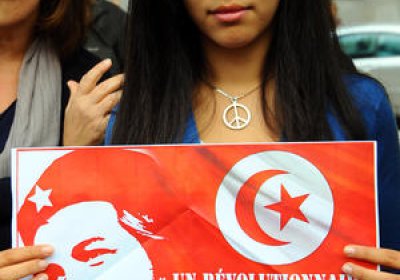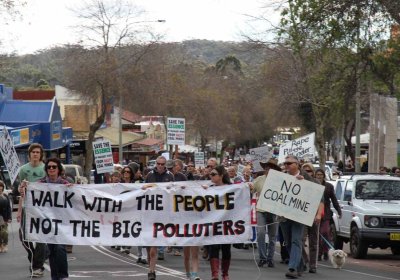After being delayed by three months, the official campaign for Tunisia's constituent assembly began on October 1, paving the way for the October 23 elections.
More than 80 different parties, many formed or legalised since the overthrow of dictator Zine el Abidine Ben Ali on January 14, and about 1500 different lists vyed for a place in the 218-member assembly.
900
An estimated 2.4 million Kenyans are facing food insecurity this year.
One cause is poor rains, which have affected all of north-east Africa and are probably at least partially the result of climate change. Another is the rising cost of imported food.
Rising food costs are also partly caused by climate change, but also by speculation. For the finance industry, food is just another commodity to be bought, sold or hoarded to generate the most profits.
The barriers to renewable energy are many. It’s not just a matter of the draconian new Victorian laws against wind farms — the legacy of government support for fossil fuels also hangs heavily over the renewables sector.
On October 16, Kenyan forces entered southern Somalia. The invasion is aimed against the Islamist militia al Shabaab. It is in response to a recent rise in cross-border kidnappings of Westerners, with four abducted in the past month.
Kenya is not the only regional country with soldiers in Somalia, which has not had a functioning government since 1991. An African Union force of 9000 Ugandan and Burundian troops has been in the country since January 2009, when it replaced an Ethiopian force.
AU troops have launched their own offensive against al Shabaab.
The latest wave of the bloodshed that has taken place in Yemen since September 18 shows the country’s hated President, Ali Abdullah Saleh, has no intention of leaving power peacefully.
At least 35 people were killed and many more were wounded in government attempts to crack down on protesters between October 15 and 18, The Guardian said on October 18.
Government forces also battled tribal fighters and defected soldiers loyal to anti-Saleh political forces.
The Socialist Alliance released this statement on the morning of October 23.
* * *
Socialist Alliance condemns violent police attacks on Melbourne and Sydney occupations
Socialist Alliance condemns the violent police dispersal of peaceful protesters at Occupy Melbourne (October 21) and Occupy Sydney (dawn, October 23) and pledges its full support for the re-establishment of these occupations against the tyranny of the world's richest 1%.
A confusing feeling passed through me after hearing about the exchange of 1027 Palestinian detainees for the only Israeli soldier, Gilad Shalit, who was held captive by the Palestinian resistance fighters.
I don’t know whether to feel happy or sad.
Gazing at the faces of the prisoners’ families in the solidarity tent in Gaza City on October 18, I see a look that I have never seen before: eyes glittering with hope. Thinking about those women whose relatives are most likely to be released and seeing their big smiles makes me happy.
On October 15, about 4000-5000 of protesters in London descended on London's financial sector as part of the “United for Global Change” actions that took place in more than 1000 cities and towns worldwide. Occupy London Stock Exchange is occupying an area in front of St Paul's Cathedral and holding people's assemblies to discuss the goals, demands and direction of the movement.
The sense of joy was palpable in the streets of Gaza on October 18 as hundreds of Palestinian prisoners jailed by Israel returned home. It was a remarkable day in the life of the territory’s 1.6 million Palestinians.
During the past five years Israel has levied a heavy price on Gaza's civilian population for the capture of Israeli soldier Gilad Shalit by Palestinian resistance fighters. It has been extracted with Israel’s warplanes, tanks, bulldozers and relentless siege.
The overwhelming success of the October 15 “United for Global Change” demonstrations (which took place in more than 1000 cities and towns in about 90 countries) is having powerful positive feedback on the indignados (15-M) movement in Spain.
Australia’s south-west is the only part of the country internationally recognised as a biodiversity hotspot. It is also a major agricultural area. The south-west town Margaret River is one of the country’s primary wine producing regions and a major tourist destination.
Green Left Weekly’s Sue Bolton has been part of the Occupy Melbourne protest since it began on October 15. Below she recounts the past week of the occupation in Melbourne’s City Square, which was broken up by a fierce police assault on October 21.
* * *
Day 5: Still going strong
We are still going strong with about 45 to 50 tents in City Square. I estimate there are about 100 people camping each night with many others staying until late in the night.
- Previous page
- Page 4
- Next page







